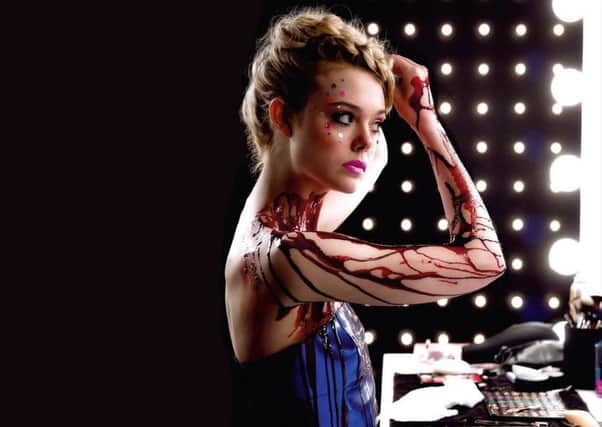Film review: The Neon Demon | Maggie's Plan | Ice Age: Collision Course


Beauty may be in the eye of the beholder, but in constructing an ultra-stylish magic-mirror image of the LA fashion business, Nicholas Winding Refn’s The Neon Demon (****) revels in the way the industry’s punishing standards for beauty’s assessment and attainment eventually make everyone connected with it absolutely hideous. Taking the modelling world’s narcissistic need to worship and devour youth to gruesomely literal extremes, the Drive director vomits forth an abstract fairytale in which Elle Fanning’s ripe for corruption babe-in-the-wood is abandoned in a morally deficient city where turning 21 is career suicide and the outwardly gorgeous are riven with insecurity-laden urges that run to the vampiric, the necrophilic and even the cannibalistic. It’s a piece of work in other words, and a piece of work liable to incur eye-rolling dismissals from style-over-content detractors who see no value in cinema operating on purely visual terms (the film was, somewhat inevitably and depressingly, booed when it premiered at Cannes earlier this year). Yet in moving even further away from Drive’s easy-to-love coolness than he did with the much-maligned, brilliantly subversive Only God Forgives, Refn demonstrates admirable boldness in his ongoing determination to challenge the form at a time when too much arthouse cinema is, in its own way, as formulaic as the comic book-obsessed mainstream.
Unafraid of embracing the empty aestheticism of the film’s setting or characters, Refn – who co-scripted it with playwrights Mary Laws and Polly Stenham – wilfully starves The Neon Demon of dramatic incident before binging on its innate depravity. The end result is a sort of bulimic descent into unpleasantness, its emetic qualities enhanced by the intentional tedium of its earlier commitment to exposing the fashion scene’s vacuity in all its forms. That’s hardly uncharted territory, but the film’s ability to find visual ways to confront it on its own terms makes it worth the trip. Particularly natty is Refn’s treatment of his main character, especially her pivotal introduction to the catwalk, which is expressed as a sort transgressive hallucination, with Fanning framed against light-sculpted triangles, mirrors and blacked-out backgrounds – the pyramidal shapes suggestive of some pharoenic curse being unleashed, the mirrors making the connection to Narcissus more prevalent.
Advertisement
Hide AdFrom the off, Fanning’s orphaned Jesse is presented as a natural beauty, but also a blank slate, a sort of mythic figure upon whom others want to project their fantasies. At 16, she is what the industry flat-out calls “fresh meat” and she soon finds herself attracting the parasitic attentions of LA’s top designers and photographers, as well as the not-quite-benevolent attentions of lower-level hangers-on and, naturally, the seething indignation of her rivals. Her main enemies come in the form of two surgically enhanced catwalk models (played by Abby Lee and Bella Heathcote), their jealousy all the more disturbing for how flatly and matter-of-factly they articulate it.
There’s menace too in the form of Keanu Reeves, who plays the shady proprietor of a low-rent hotel and blames Jesse when, in a surreal and entertainingly symbolic moment, she discovers a mountain lion eating her room. Working with cinematographer Natasha Braier, Refn keeps the colour scheme typically primary; it’s all blues and reds, hued for coolness and sleaze, the horror movie mood further enhanced by regular composer Cliff Martinez’s synth-heavy score. Refn is on a singular journey here and while The Neon Demon is by no means perfect, its flawed beauty is plain to see.
On a gentler note, Maggie’s Plan (***) is a grown-up romantic comedy with a disappointingly adolescent plot. It’s not nearly sophisticated enough to match the complexity of its characters, whose labyrinthine romantic entanglements have a truthful ring to them. Greta Gerwig takes the lead as the titular Maggie, a life-plan-obsessed college administrator whose desire to have a baby before her biological clock starts working against her has yet to coincide with meeting the right guy. Deciding to have a baby via artificial insemination, she approaches an old college acquaintance to act as a donor but, inevitably, hooks up with the married academic (Ethan Hawke) she’s been growing closer to over the preceding months. What follows isn’t quite as predictable as that description implies, but sadly the end result is. Nevertheless, both Gerwig and Hawke do good work here playing characters whose relationship needs compliment each other in ways that are detrimental to their long term happiness together. Though much broader in tone, Julianne Moore’s arrival as Hawke’s formidable and strangely accented ex-wife also illuminates how relationships rarely conform to the schema we’re taught to expect from literature and films. Ironically, though, that just makes the film’s own predictability all the more frustrating.
Finally this week, Ice Age: Collision Course (**) arrives just in time for the school holidays. It’s the fifth instalment of the animated franchise and is as tired as you might expect from a series with this many entries. As ever, the calamity inducing antics of acorn-chasing squirrel Scrat offer a few chaotic moments of animated respite from the rest of the film, but mostly this just serves up yet more dreary, very American family values messages in the guise of an adventure story about a the same group of prehistoric animals facing imminent destruction from the elements yet again (this time a comet is hurtling towards Earth). Ray Ramano, Queen Latifah and Jennifer Lopez are among the returning voice cast, but their work is pretty anonymous and only Simon Pegg’s piratical weasel brings any energy to proceedings.